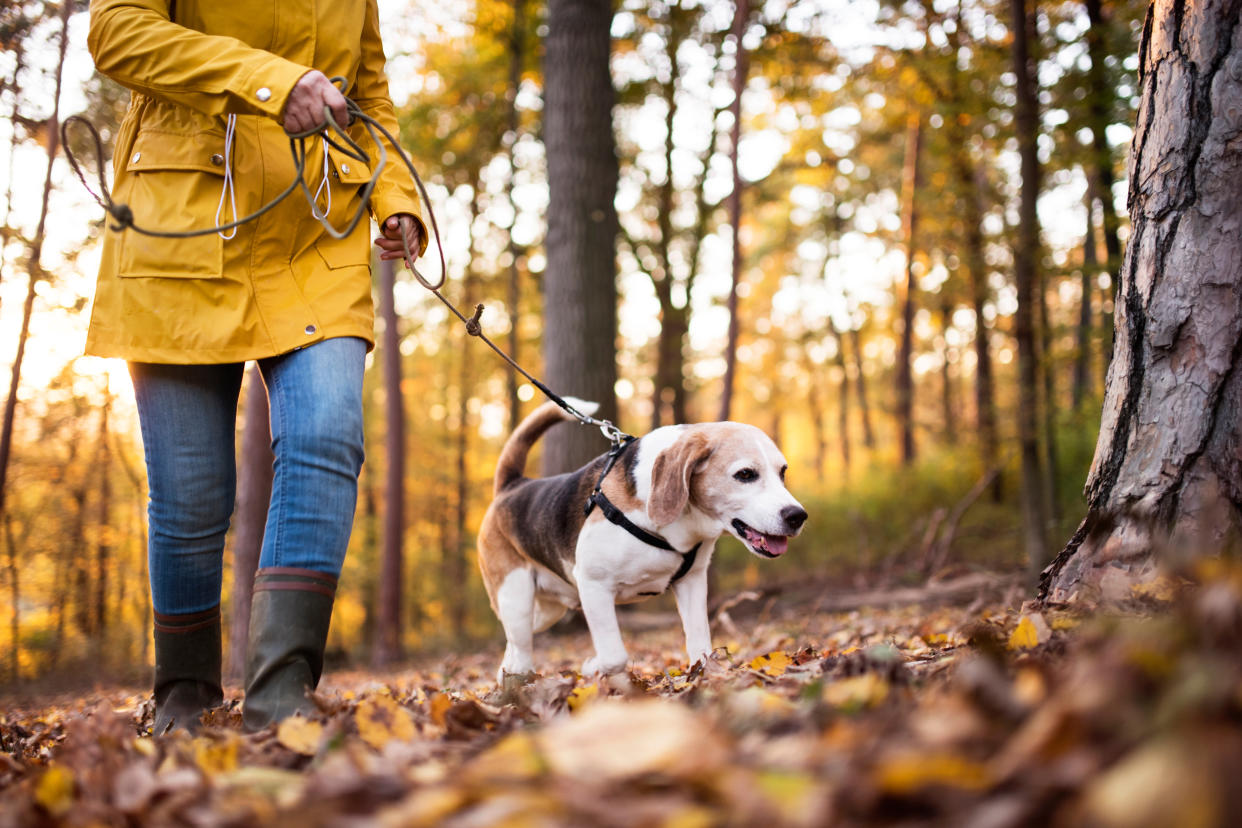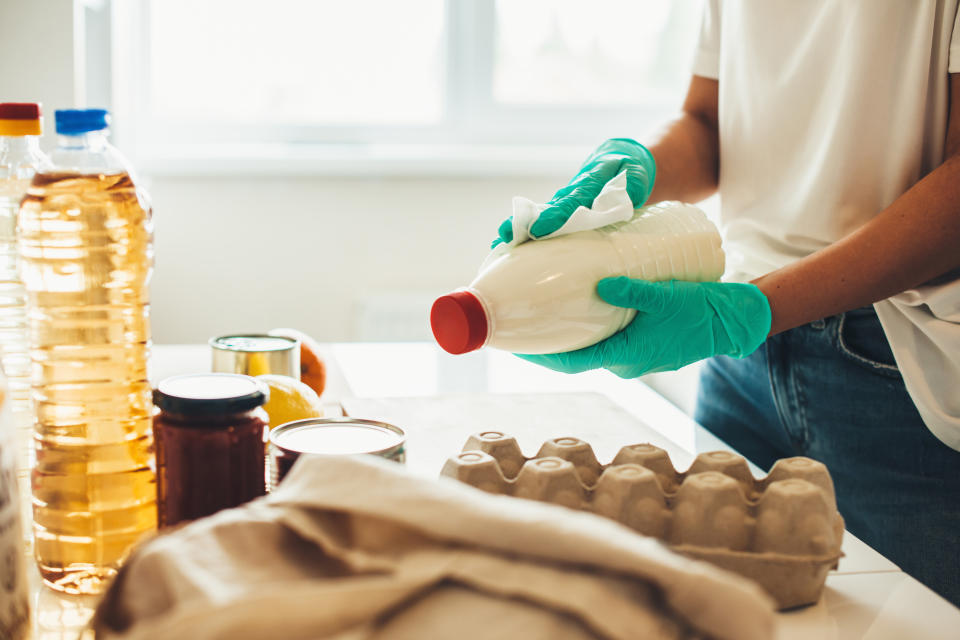Dog walkers 78% more likely to catch coronavirus in first lockdown, study suggests

Walking the dog may raise a person’s risk of catching the coronavirus, research suggests.
Scientists from the Andalusian School of Public Health in Grenada sent a survey to more than 2,000 residents throughout Spain during the country’s strict first lockdown.
Out of all the “sociodemographic” factors that could have raised a person’s risk of catching the coronavirus, walking the dog was found to have the strongest effect, increasing the odds by 78%.
The risk of pets transmitting the infection to their owners, and vice versa, has been debated since the start of the outbreak, with studies throwing up mixed results.
Read more: Pandemic anxiety leading to rise in jaw-clenching
The Grenada scientists stressed data cannot confirm or disregard the risk, but added the odds of a dog testing positive for the coronavirus is “extremely unlikely”.
Pet owners may face a higher risk due to the “unhygienic habits of dogs on the streets and their subsequent return home”, they added.

The coronavirus makes up the largest pandemic of the past 100 years.
To help officials get a handle on the outbreak, the Grenada scientists felt it was necessary to study the characteristics of those who test positive.
A survey was completed by more than 2,000 people, of whom over 40% were between 40 and 54.
The participants were asked about their “sociodemographic characteristics”, activities during lockdown, and any confirmed or suspected coronavirus.
Results, published in the journal Environmental Research, suggest living with a person with the infection raised a member of their household’s risk of catching the virus by 60 times.
Walking a dog was found to have the strongest effect of “all the sociodemographic variables analysed”, increasing the risk by 78%.
Owning cats or other pets was not linked to heightened odds of the infection.
Concerns were raised early in the outbreak when a dog in Hong Kong tested “weak positive” for the coronavirus, however, experts stressed there was “no evidence pet animals can be a source of infection”.
A tiger in a New York zoo also hit the headlines when it caught the virus, even developing a tell-tale dry cough.
When it comes to animals catching the coronavirus, experts have previously warned against “mass hysteria”.
Read more: Mass coronavirus testing ‘will fail miserably’
Nevertheless, research has recently linked the potential transmission from dogs to humans as being behind the “extreme outbreak in North Italy”.
Dogs are said to have a similar receptor to humans on their cells, which the coronavirus uses to infect the body.
The coronavirus passing to animals from humans and vice versa is said to be “plausible”, with “no data available to confirm or exclude the possibility of such human-to-dog and dog-to-human infection”.
While the coronavirus has had more than 55 million confirmed cases since the outbreak was identified, the scientists stressed the possibility of a human testing positive for the infection is still relatively “low”. The risk of a dog being diagnosed is therefore “extremely unlikely”.
“These results point to living with dogs as a strong risk factor for COVID-19 [the disease caused by the coronavirus] infection,” wrote the scientists.
“Subsequent studies are needed to determine whether the reason for this intense increase in the risk of [the coronavirus] infection is due to cross-infection between humans and dogs or to the concept of dog as a vehicle, increasing exposure to the virus derived from behaviour and unhygienic habits of dogs on the streets and their subsequent return home.”
Outbreaks have emerged on several mink farms worldwide. The infection was thought to have passed from farmers into the animals and then occasionally back into humans, raising the risk the virus will mutate.
Watch: Dogs investigated to see if they can smell coronavirus via BO
When it comes to warding off the coronavirus, the results suggest disinfecting market-purchased products when home reduced the risk of catching the infection by 94%.
This made disinfection more effective than other hygiene measures, like wearing masks or gloves.
Working “on site”, as opposed to from home, raised the risk of catching the coronavirus by 76%.
Read more: Coronavirus vaccine will not have been rushed
After a “state of alarm” was introduced in Spain on 14 March, “only basic services and essential activities” could be carried out, like firefighting, the food industry and road maintenance.
Perhaps surprisingly, infection rates were found to be higher among those who “used the modality of acquiring basic commodities using home delivery service compared to those who chose in-store shopping”.
Are pets a risk amid coronavirus outbreak?
The coronavirus spreads between humans; predominantly when infected droplets are expelled in a cough or sneeze. There is also evidence the virus can survive on surfaces or be transmitted via faeces.
Dogs and cats, both big and domestic, have tested positive for the infection.
When news of the “weak positive” Hong Kong dog broke, Professor Jonathan Ball from the University of Nottingham stressed “we have to differentiate between real infection and just detecting the presence of the virus”.
“The fact the test result was weakly positive would suggest this is environmental contamination or simply the presence of coronavirus shed from human contact that has ended up in the dog’s samples,” he said.
Professor Glenn Browning from the University of Melbourne agreed animal owners should not panic, adding: “People appear to pose more risk to their pets than they do to us.”
The World Health Organization stresses, however, anyone with confirmed or susceptible coronavirus should “limit contact with companion and other animals”.
“When handling and caring for animals, basic hygiene measures should always be implemented,” it added.
“This includes hand washing after handling animals, their food or supplies, as well as avoiding kissing, licking or sharing food.”
Watch: Dog face masks flying off the shelves amid coronavirus



